Supreme Court Term 2024-2025
WeÔÇÖre breaking down the cases we've asked the court to consider this term.
Latest Case Updates
Ongoing
Updated June 13, 2025
Closed (Judgment)
Updated June 6, 2025
Ongoing
Updated May 8, 2025
Ongoing
Updated March 24, 2025
Featured
Georgia Supreme Court
Jun 2025

Voting Rights
Eternal Vigilance Action, Inc. v. Georgia
The ╠ăđ─Vlogand partner organizations intervened in this case to represent the rights of voters and voting-rights organizations in a case challenging a number of rules passed by the Georgia State Election Board. We challenged the rule requiring that the number of votes cast be hand counted at the polling place prior to the tabulation of votes. In a critical victory for Georgia voters, in June 2025, the Georgia Supreme Court upheld a lower courtÔÇÖs decision permanently blocking the rule requiring hand counting of ballots at polling places before tabulation ÔÇö a process widely criticized for risking delays, ballot spoliation, and voter disenfranchisement.
U.S. Supreme Court
May 2025

Voting Rights
Racial Justice
Allen v. Milligan
Whether AlabamaÔÇÖs congressional districts violate Section 2 of the Voting Rights Act because they discriminate against Black voters. We succeeded in winning a new map for 2024 elections which, for the first time, has two congressional district that provide Black voters a fair opportunity to elect candidates of their choosing despite multiple attempts by Alabama to stop us at the Supreme Court. Despite this win, Alabama is still defending its discriminatory map, and a trial was held in February 2025 to determine the map for the rest of the decade.
In May 2025, a federal court ruled that Alabama's 2023 congressional map both violates Section 2 of the Voting Rights Act and was enacted by the Alabama Legislature with racially discriminatory intent.
Washington, D.C.
Apr 2025

Voting Rights
League of Women Voters Education Fund v. Trump
On March 25, 2025, in a sweeping and unprecedented Executive Order, President Trump attempted to usurp the power to regulate federal elections from Congress and the States. Among other things, the Executive Order directs the Election Assistance CommissionÔÇöan agency that Congress specifically established to be bipartisan and independentÔÇöto require voters to show a passport or other citizenship documentation in order to register to vote in federal elections. If implemented, the Executive Order would threaten the ability of millions of eligible Americans to register and vote and upend the administration of federal elections.
On behalf of leading voter registration organizations and advocacy organizations, the ╠ăđ─Vlogand co-counsel filed a lawsuit to block the Executive Order as an unconstitutional power grab.
Maryland
Apr 2025

Religious Liberty
LGBTQ Rights
Mahmoud v. Taylor
On April 9, 2025, the ╠ăđ─Vlogand ╠ăđ─Vlogof Maryland filed an amicus brief with the U.S. Supreme Court supporting the Montgomery County Public Schools (MCPS) in its efforts to ensure that its English Language Arts curriculum is LGBTQ-inclusive.
U.S. Supreme Court
Mar 2025

Voting Rights
Callais v. Landry
Whether the congressional map Louisiana adopted to cure a Voting Rights Act violation in Robinson v. Ardoin is itself unlawful as a gerrymander.
New Hampshire
Mar 2025
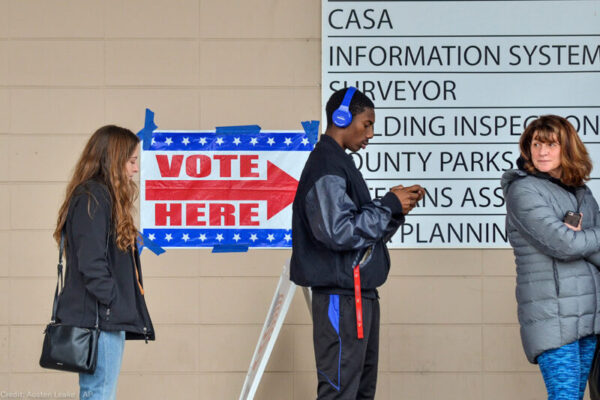
Voting Rights
Coalition for Open Democracy v. Scanlan
This lawsuit challenges HB 1569, a new law that will make New Hampshire the only state to require every person to produce documentary proof of citizenship when they register to vote for both state and federal elections. It also challenges HB 1569ÔÇÖs elimination a preexisting protection for votersÔÇönamely, an affidavit option that allowed voters who faced surprise challenges to their eligibility at the polls to swear to their qualifications and cast a ballot. Accordingly, HB 1569 violates the First and Fourteenth Amendments of the U.S. Constitution by placing substantial burdens on New Hampshirites at all stages of the voting process, and will arbitrarily disenfranchise hundreds, if not thousands of qualified voters.
South Carolina Supreme Court
Jan 2025
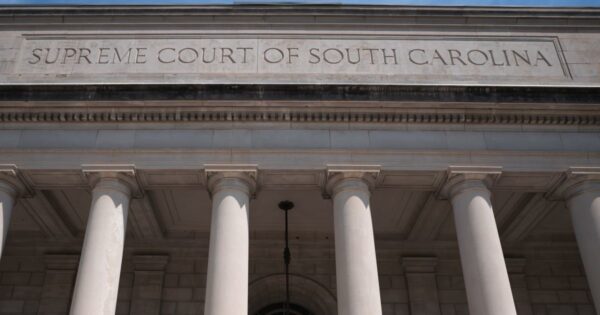
Voting Rights
League of Women Voters of South Carolina v. Alexander
This case involves a state constitutional challenge to South CarolinaÔÇÖs 2022 congressional redistricting plan, which legislators admit was drawn to entrench a 6-1 Republican majority in the stateÔÇÖs federal delegation. Plaintiff the League of Women Voters of South Carolina has asked the stateÔÇÖs Supreme Court to conclude that the congressional map is an unlawful partisan gerrymander that violates the state constitution.
Texas
Oct 2024
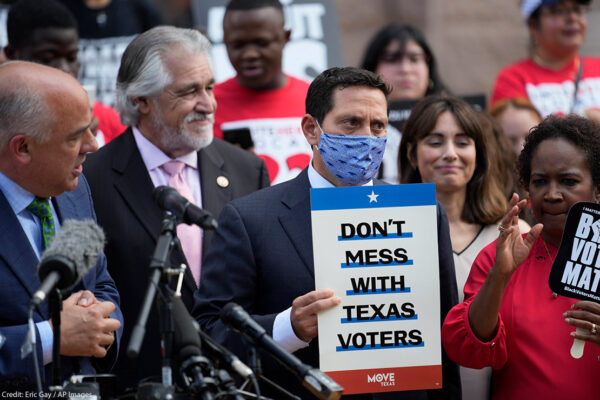
Voting Rights
OCA-Greater Houston v. Paxton
Texas has growing Hispanic and Black populations that helped propel record voter turnout in the November 2020 election. The Texas Legislature responded to this increased civic participation with an omnibus election bill titled Senate Bill 1ÔÇöSB 1 for shortÔÇöthat targeted election practices that made voting more accessible to traditionally marginalized voters like voters of color, voters with disabilities, and voters with limited English proficiency. Since 2021, SB 1 has resulted in tens of thousands of lawful votes being rejected, and it remains a threat to democracy in Texas.
Ohio
Sep 2024

Reproductive Freedom
Planned Parenthood Southwest Ohio Region et al., v. Ohio Department of Health, et al.
The ╠ăđ─Vlog, the ╠ăđ─Vlogof Ohio, Planned Parenthood Federation of America, the law firm WilmerHale, and Fanon Rucker of the Cochran Law Firm, on behalf of Planned Parenthood Southwest Ohio Region, Planned Parenthood of Greater Ohio, Preterm-Cleveland, WomenÔÇÖs Med Group Professional Corporation, Dr. Sharon Liner, and Julia Quinn, MSN, BSN, amended a complaint in an existing lawsuit against a ban on telehealth medication abortion services to bring new claims under the Ohio Reproductive Freedom Amendment, including additional challenges to other laws in Ohio that restrict access to medication abortion in the state.
All Cases
1,584 Court Cases
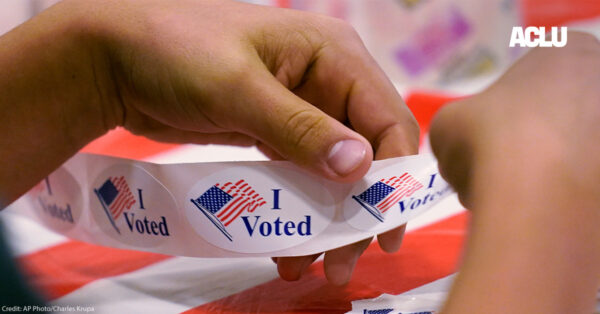
Iowa
Nov 2024
Voting Rights
Selcuk v. Pate
Just two weeks out from the November 2024 presidential election, Iowa Secretary of State Paul Pate issued a directive to county clerks to challenge more than 2,000 voters at the polls on Election Day and force them to vote a provisional ballot that will count only if the voter can prove their citizenship.
The SecretaryÔÇÖs list of more than 2,000 voters does not adequately account for Iowans who have recently become U.S. citizens through naturalization, and thus risks disenfranchising scores of eligible voters based on national origin. The SecretaryÔÇÖs eleventh-hour gambit violates several provisions of the U.S. Constitution and federal law, and we have thus filed emergency suit to enjoin the directive.
Explore case
Iowa
Nov 2024

Voting Rights
Selcuk v. Pate
Just two weeks out from the November 2024 presidential election, Iowa Secretary of State Paul Pate issued a directive to county clerks to challenge more than 2,000 voters at the polls on Election Day and force them to vote a provisional ballot that will count only if the voter can prove their citizenship.
The SecretaryÔÇÖs list of more than 2,000 voters does not adequately account for Iowans who have recently become U.S. citizens through naturalization, and thus risks disenfranchising scores of eligible voters based on national origin. The SecretaryÔÇÖs eleventh-hour gambit violates several provisions of the U.S. Constitution and federal law, and we have thus filed emergency suit to enjoin the directive.
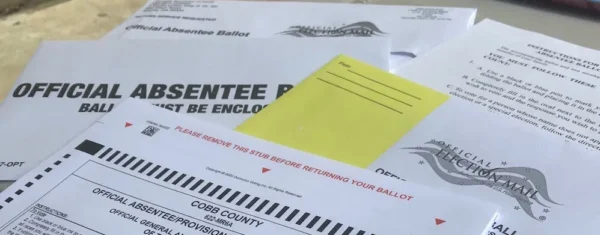
Georgia
Nov 2024
Voting Rights
Ayota v. Fall
On October 31, 2024, just five days before the November 5 General Election, Cobb County announced that it had failed to send more than 3,000 absentee ballots to Cobb County voters who had timely requested them. Many of these voters are at school hundreds of miles away or have disabilities that make it all but impossible to vote in person. The ╠ăđ─Vlogand co-counsel sued on behalf of affected voters to ensure that they would not be disenfranchised because of the County's administrative error.
Explore case
Georgia
Nov 2024

Voting Rights
Ayota v. Fall
On October 31, 2024, just five days before the November 5 General Election, Cobb County announced that it had failed to send more than 3,000 absentee ballots to Cobb County voters who had timely requested them. Many of these voters are at school hundreds of miles away or have disabilities that make it all but impossible to vote in person. The ╠ăđ─Vlogand co-counsel sued on behalf of affected voters to ensure that they would not be disenfranchised because of the County's administrative error.

Maine
Oct 2024
Religious Liberty
Crosspoint v. Makin
The ACLU, ╠ăđ─Vlogof Maine, and Americans United for Separation of Church and State filed an amicus brief with the U.S. Court of Appeals for the First Circuit arguing that religious schools in Maine participating in MaineÔÇÖs school tuition program must comply with all eligibility requirements of the program, including a prohibition on discrimination against students based on their religion, sexual orientation, and gender identity.
Explore case
Maine
Oct 2024

Religious Liberty
Crosspoint v. Makin
The ACLU, ╠ăđ─Vlogof Maine, and Americans United for Separation of Church and State filed an amicus brief with the U.S. Court of Appeals for the First Circuit arguing that religious schools in Maine participating in MaineÔÇÖs school tuition program must comply with all eligibility requirements of the program, including a prohibition on discrimination against students based on their religion, sexual orientation, and gender identity.
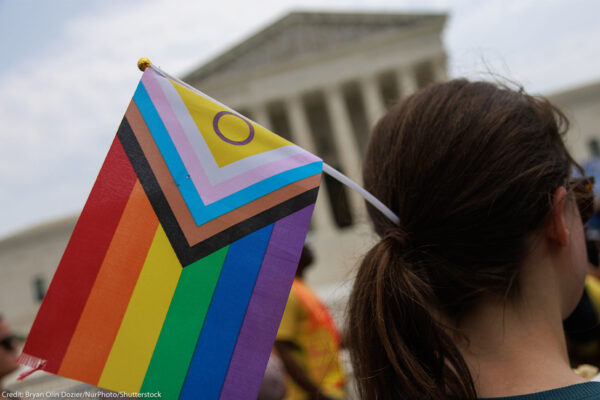
Washington
Oct 2024
LGBTQ Rights
Religious Liberty
Aubry McMahon v. World Vision, Inc.
On October 28, 2024, the ╠ăđ─Vlogand ╠ăđ─Vlogof Washington filed an amicus brief in the U.S. Court of Appeals for the Ninth Circuit supporting affirmance of a Washington district court decision holding that a religiously affiliated nonprofit organization violated Title VII and the Washington State antidiscrimination law when it rescinded a hiring candidateÔÇÖs job offer because she is a woman married to a person of the same sex. Should the Ninth Circuit accept the organizationÔÇÖs First Amendment defenseÔÇöthat religious organizations can discriminate on any basis so long as it is grounded in their religious beliefÔÇöit would gut employment protections for LGBTQ individuals and pave the way for religious organizations to discriminate on the basis of not only sex, sexual orientation, and gender identity but also other protected characteristics like race, color, and national origin.
Explore case
Washington
Oct 2024

LGBTQ Rights
Religious Liberty
Aubry McMahon v. World Vision, Inc.
On October 28, 2024, the ╠ăđ─Vlogand ╠ăđ─Vlogof Washington filed an amicus brief in the U.S. Court of Appeals for the Ninth Circuit supporting affirmance of a Washington district court decision holding that a religiously affiliated nonprofit organization violated Title VII and the Washington State antidiscrimination law when it rescinded a hiring candidateÔÇÖs job offer because she is a woman married to a person of the same sex. Should the Ninth Circuit accept the organizationÔÇÖs First Amendment defenseÔÇöthat religious organizations can discriminate on any basis so long as it is grounded in their religious beliefÔÇöit would gut employment protections for LGBTQ individuals and pave the way for religious organizations to discriminate on the basis of not only sex, sexual orientation, and gender identity but also other protected characteristics like race, color, and national origin.
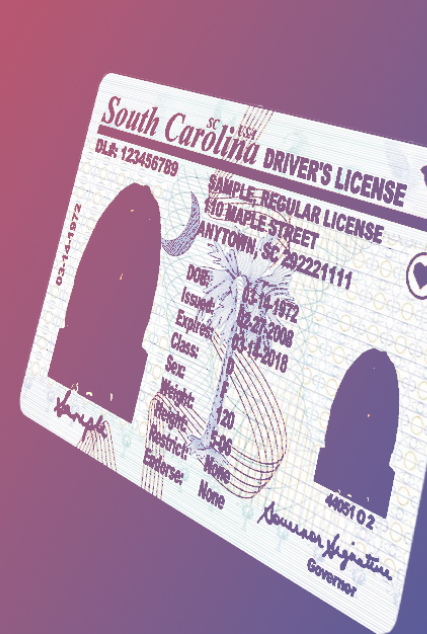
South Carolina
Oct 2024
Voting Rights
╠ăđ─Vlog of South Carolina v. State Election Commission
The South Carolina Department of Motor Vehicles (SCDMV) has unlawfully denied young, eligible South Carolinians the opportunity to register to vote. Under South Carolina law, individuals who are 17 years old may register to vote and vote in primary elections so long as they (1) will turn 18 on or before the next general election, and (2) otherwise meet the qualifications for voting. An administrative error in the SCDMV's processes, however has stopped the Department from transmitting the proper paperwork to complete all registration information to the South Carolina Elections Commission. As a result, thousands of young voters who did everything right and should have been registered to vote have not been added to the state's voter rolls in the runup to the 2024 general election. ╠ăđ─Vlogand ╠ăđ─Vlogof South Carolina sued, asking the court to ensure that these new voters are registered and properly notified in time for them to vote in the November 2024 election.
Explore case
South Carolina
Oct 2024

Voting Rights
╠ăđ─Vlog of South Carolina v. State Election Commission
The South Carolina Department of Motor Vehicles (SCDMV) has unlawfully denied young, eligible South Carolinians the opportunity to register to vote. Under South Carolina law, individuals who are 17 years old may register to vote and vote in primary elections so long as they (1) will turn 18 on or before the next general election, and (2) otherwise meet the qualifications for voting. An administrative error in the SCDMV's processes, however has stopped the Department from transmitting the proper paperwork to complete all registration information to the South Carolina Elections Commission. As a result, thousands of young voters who did everything right and should have been registered to vote have not been added to the state's voter rolls in the runup to the 2024 general election. ╠ăđ─Vlogand ╠ăđ─Vlogof South Carolina sued, asking the court to ensure that these new voters are registered and properly notified in time for them to vote in the November 2024 election.
